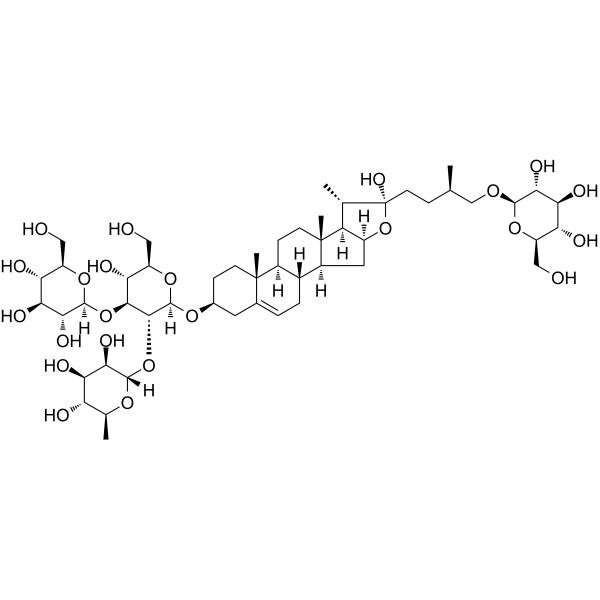
Protogracillin
CAS No. 54848-30-5
Protogracillin( —— )
Catalog No. M27957 CAS No. 54848-30-5
Protogracillin is a steroidal saponin isolated from Dioscorea zingiberensis Wright (DZW) which may inhibit platelet aggregation (PAG) and thrombosis. Steroidal saponins from DZW rhizomes have the potential to reduce the risk of cardiovascular diseases by anti-thrombotic action.
Purity : >98% (HPLC)
 COA
COA
 Datasheet
Datasheet
 HNMR
HNMR
 HPLC
HPLC
 MSDS
MSDS
 Handing Instructions
Handing Instructions
| Size | Price / USD | Stock | Quantity |
| 2MG | 129 | Get Quote |


|
| 5MG | 222 | Get Quote |


|
| 10MG | 331 | Get Quote |


|
| 25MG | 536 | Get Quote |


|
| 50MG | 777 | Get Quote |


|
| 100MG | 1044 | Get Quote |


|
| 200MG | Get Quote | Get Quote |


|
| 500MG | Get Quote | Get Quote |


|
| 1G | Get Quote | Get Quote |


|
Biological Information
-
Product NameProtogracillin
-
NoteResearch use only, not for human use.
-
Brief DescriptionProtogracillin is a steroidal saponin isolated from Dioscorea zingiberensis Wright (DZW) which may inhibit platelet aggregation (PAG) and thrombosis. Steroidal saponins from DZW rhizomes have the potential to reduce the risk of cardiovascular diseases by anti-thrombotic action.
-
DescriptionProtogracillin is a steroidal saponin isolated from Dioscorea zingiberensis Wright (DZW) which may inhibit platelet aggregation (PAG) and thrombosis. Steroidal saponins from DZW rhizomes have the potential to reduce the risk of cardiovascular diseases by anti-thrombotic action.(In Vitro):Paris polyphylla J.E. Smith is extensively used in traditional systems of Indian and Chinese medicines mainly for its anticancerous property. The national and international demand for P. polyphylla is constantly increasing and most of the supplies come from wild. Illegal and unscientific exploitation coupled with habitat destruction decreases the natural population of the herb, as a consequence this species comes under vulnerable category. Restoration and conservation of the natural population of this potential herb is prerequisites. METHODS AND RESULTS: This article aims to provide an overview on chemical and biological prospective of P. polyphylla. Secondary metabolites such as daucosterol, polyphyllin D, β -ecdysterone, Paris saponins I, II, V, VI, VII, H, dioscin, oligosaccharides, heptasaccharide, octasaccharide, trigofoenoside A, Protogracillin, Paris yunnanosides G-J, padelaoside B, pinnatasterone, formosanin C and 20-hydroxyecdyson saponins have been isolated from P. polyphylla. Several biological activities such as anticancerous, antitumor, cytotoxic, anthelmintic, antimicrobial, antiangiogenic, immunostimulating, contractile and hemostatic have also been reported. CONCLUSIONS: Consequently, this review will be helpful to the researcher and scientist for further research.
-
In Vitro——
-
In Vivo——
-
Synonyms——
-
PathwayOthers
-
TargetOther Targets
-
RecptorCa(2+) receptor
-
Research Area——
-
Indication——
Chemical Information
-
CAS Number54848-30-5
-
Formula Weight1065.2
-
Molecular FormulaC51H84O23
-
Purity>98% (HPLC)
-
SolubilityIn Vitro:?DMSO : ≥ 100 mg/mL (93.88 mM)
-
SMILESO[C@H]1[C@H](OC[C@H](C)CC[C@]2(O)[C@@H](C)[C@]3([H])[C@](CC4)(C)[C@](C[C@]3([H])O2)([H])[C@@]5([H])[C@@]4([H])[C@](CC[C@H](O[C@H](O[C@H](CO)[C@H]6O)[C@H](O[C@H](O[C@H]7C)[C@H](O)[C@H](O)[C@H]7O)[C@H]6O[C@@H]([C@H](O)[C@H]8O)O[C@H](CO)[C@H]8O)C9)(C)C9=CC5)O[C@H](CO)[C@H]([C@@H]1O)O
-
Chemical Name——
Shipping & Storage Information
-
Storage(-20℃)
-
ShippingWith Ice Pack
-
Stability≥ 2 years
Reference
1.Sewing KF, et al. Calcium channel antagonists verapamil and gallopamil are powerful inhibitors of acid secretion in isolated and enriched guinea pig parietal cells. Pharmacology. 1983;27(1):9-14.
molnova catalog



related products
-
Suc-Leu-Tyr-AMC
Suc-Leu-Tyr-AMC is a fluorescent substrate for calpain I and II, papain (another cysteine protease), and is used to measure the chymotrypsin-like peptidase activity of the 20S proteasome (excitation max: 360 nm; emission max: 460 nm). Suc-Leu-Tyr-AMC can also be cleaved by the Ti protease from E. coli.
-
Carprazidil
Carprazidil is a potent vasodilator used to treat severe hypertension and mild heart failure.
-
LCMV gp33-41 (TFA) (...
LCMV gp33-41 (TFA), the carboxyl-extended 11-aa-long peptide, is an lymphocytic choriomeningitis virus sequence restricted by MHC class I H-2Db molecules and presented to cytotoxic T lymphocytes.



 Cart
Cart
 sales@molnova.com
sales@molnova.com


